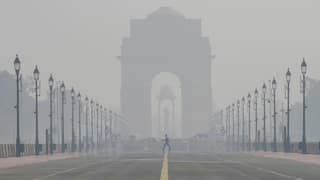'New Cold War' brewing in Indian Ocean, says expert

By Reena Bhardwaj
Washington D C [United States], Feb. 23 (ANI): One of Australia's leading academic experts on strategy and security in South Asia and the Indian Ocean region and others have said that ongoing political crisis in The Maldives could provoke an even larger crisis in the immediate future, possibly resulting in the involvement of both India and China.
Speaking to ANI, Dr. David Brewster, a senior analyst with the National Security College, Australian National University, has predicted greater strategic rivalry between major powers, including India and China, as both have an eye on expanding their roles and presence in the Indian Ocean Region (IOR).
Maldives' autocratic president Abdulla Yameen's move to crack down on the opposition to consolidate his power in the archipelago, is being seen by both diplomats and analysts as provoking a larger crisis that could draw China and India, and also lead to the recreation of a more multi-polar and complex Indian Ocean environment .
"In the last few days we have seen growing strategic rivalry between major powers such as China and India as they expand their roles in the region," Dr. Brewster said.
"We are now also seeing new players competing to build their own areas of influence and blocs in the Indian Ocean and this could be another concern for India", he added.
Looking at the situation in The Maldives from the Indian perspective, Dr. Brewster and other experts have maintained that New Delhi is naturally concerned about China's growing influence and presence in the IOR, and is looking for ways to counter-balance Beijing by deepening its ties with the ASEAN and EAS nations Blocs on their respective approaches and initiatives.
India is particularly alarmed by the growing Chinese presence in the region and is responding. On the diplomatic front, India has been deepening ties with Southeast Asian nations, many of which have been looking to India to counter-balance China's growing power and influence. This includes building forward operating bases or staging facilities in India's own Andaman and Nicobar Islands - near the Malacca Strait - as well as in island states such as Seychelles and Mauritius.
The recent finalisation of logistics exchange deal between India and France also potentially opens up French facilities in the western Indian Ocean (such as Djibouti and Reunion) for use by India.
"The latest development is a deal between India and Oman, under which the Indian Navy will have access to the port of Duqm in Oman for logistics and maintenance. The deal may also include the development of oil storage facilities near Duqm for use as part of India's strategic oil reserve," analysed Dr. Brewster
From the Chinese perspective, experts and analysts have noted President Yameen's tilt towards China economically since assuming office in 2013, courting infrastructure investment, tourism flows, and signing a free trade deal with Beijing.
Experts believe that the Maldives is just another front for the Chinese.The small island nation has become a significant target for Beijing's ambitious economic expansion. Its international airport, the major road connecting it to the capital and other projects fall under "One Belt, One Road."
China has deep-rooted economic, political and military interests not just in the Maldives but also the Indian Ocean, and it's not going to be a win-win situation for India, reveal experts.
From China's perspective it's a no-brainer - some two-thirds of the world's oil shipments cross the Indian Ocean, and those waterways are a critical part of Beijing's Belt and Road Initiative.China is also spending billions on Indian Ocean ports and related infrastructure in neighboring Pakistan, Sri Lanka, Bangladesh, and Nepal. This includes the development of a network of naval and military bases around the Indian Ocean littoral, starting with Djibouti (opened last year) and a new base likely to be built at or near Gwadar in Pakistan.
"Further, China will seek partners in the Persian Gulf, East Africa and in the central/eastern Indian Ocean, although the exact identity of those partners is not yet certain. They will need this in order to provide coverage for the entire space to protect energy sources and transportation and its other interests in the Indian Ocean." revealed Dr. Brewster.
According to experts, nuclear powers China, India and Pakistan are engaged in a strategic power game in the IOR.
Although Pakistan has used the Maldives as an outpost for its spy agency, Inter-Services Intelligence (ISI), for years now, the pro-Pakistan and seemingly anti-India stance of the Yameen regime has given rise to concerns that the atoll nation could be the next hotspot of transnational terror organisations, which may carry out 26/11-type terror attacks against India reveal analysts.
Already, the Maldives has witnessed a rapid radicalisation of its youth since Yameen came to power. There have been reports of many Maldivian youths joining jihadist groups in Syria.
This radicalisation is sponsored by Wahhabi funds from Saudi Arabia - a country which is investing heavily in the Maldives for its own strategic interests.There were also reports that the Maldives was going to "sell" Faafu - one of its 26 natural atolls - to Saudi Arabia. And, this has alarmed India.
As things stand today, the Maldives has become a potential military threat to India because of China and a potential terror threat because of Pakistan and Saudi Arabia, and Yameen is directly responsible for it.
Several new "non-traditional" players have become active in the Indian Ocean region, which may make the regional security environment much more complex than in the past. These include regional middle powers such as Saudi Arabia, United Arab Emirates (UAE), Turkey, and Iran, which have played little or no security role in the Indian Ocean in modern times.
Two new power blocs have emerged in the Middle East, Saudi Arabia, UAE, and Egypt on one side and Turkey, Iran, and Qatar on the other. These rivalries are now bleeding further into the Indian Ocean. Saudi Arabia has been engaging in active checkbook diplomacy with the tiny (Muslim) island states of Comoros and the Maldives in an effort to outflank regional rival Iran.
Although many would consider it unlikely, the potential for a Saudi naval base in the Maldives is highly likely. Saudi Arabia's close relationship with the Maldives is also of growing concern to India.
"I think there are many similarities with the Cold War in terms of major powers jostling for influence among smaller and poorer countries. But it is also much more complex, with many new players. In my view, in coming years the Indian Ocean will be much less peaceful than it was during the Cold War," said Dr. Brewster.
The changes in the Indian Ocean strategic environment also underline doubts over Washington's commitment to the region, and some regional players appear to be positioning themselves for what they see as an inevitable draw down in U.S. forces.
America's friends and competitors are very much aware that the U.S. shale oil revolution has put the United States on the path to becoming the world's biggest net oil exporter within the next decade.
China's moves, and U.S. and Indian responses, have led some analysts to worry about a "new Cold War" brewing in the Indian Ocean. Although the Trump administration has recently announced its new "free and open Indo-Pacific strategy. It is not clear what this means in practice for the Indian Ocean. There is little evidence as yet that the United States is a serious player in countering the influence that Beijing is buying with its Belt and Road Initiative.
Dr. Brewster explained, "The United States will need to do things differently in the Indian Ocean. With the Maldives however, the United States, Australia and others will expect India to take the lead. This has been the case since at least the 1980s. India's partners will support India's actions in the Maldives, but India must take the lead."
Overall, experts feel that both India and China may not over extend themselves and engaged in what they refer to as " a real tussle over the Maldives, as the islands are too small fry for that.
They, however, do admit that relations between the two Asian giants are touchy.
The turmoil in Maldives is a reminder that as China seeks greater commercial and strategic influence in Asia in the coming years, frictions between the world's two most populous nations - one a democracy, the other an autocracy - are set to grow.
Adding to that the new rivalries playing out in the Indian Ocean are to a large extent driven by rivalries centered in the Persian Gulf and the Levant.
Dr. Brewster concludes, Just as we saw in the Cold War, the jostling of richer and more powerful countries for influence among small and weak Indian Ocean states can spill over into considerable political instability right across the region." (ANI)
This story has not been edited. It has been published as provided by ANI




























